Our Founding Fathers recognized the importance of protecting our citizens from the government. They felt the best way to do this was to include the Bill of Rights along with the U.S. Constitution to limit the powers of the government. As such, you have certain rights whenever you are approached by police and can take action against officers who act outside the law. Your exact course of action will depend on the violation, so before you decide on one, you’ll first need to know what an officer can and cannot do.
Traffic Stops
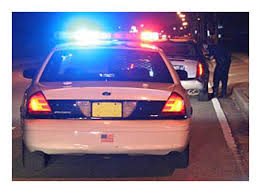 Police may pull you over if they have reasonable cause to believe you have committed an offense. The only information you are required to give an officer is your driver’s license, registration, and proof of insurance. They may not search your vehicle unless you give them consent or there is probable cause for them to believe you have illegal substances. Officers may allow a drug-sniffing dog to walk around your vehicle and smell for drugs. If the animal alerts, courts have ruled this is sufficient cause for an ensuing search. You could file charges for harassment if you are unnecessarily detained or otherwise have your rights violated.
Police may pull you over if they have reasonable cause to believe you have committed an offense. The only information you are required to give an officer is your driver’s license, registration, and proof of insurance. They may not search your vehicle unless you give them consent or there is probable cause for them to believe you have illegal substances. Officers may allow a drug-sniffing dog to walk around your vehicle and smell for drugs. If the animal alerts, courts have ruled this is sufficient cause for an ensuing search. You could file charges for harassment if you are unnecessarily detained or otherwise have your rights violated.
If you are given a ticket, you have two options: plead guilty and pay the fine or contest it in a court of law. The ticket itself will give you the date, time and place for your court hearing to take place. If you wish to contest the ticket, show up at the appointed place and time ready to argue your case. Bring any evidence or witnesses you may have along with you. The judge will hear both sides of the case and then make a determination. In some states, you could elect to take driver improvement training in lieu of paying the fine if this is your first offense.
Stopped at DUI Checkpoints
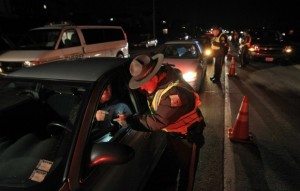 Police are increasingly using sobriety checkpoints to cut down on the number of drinking and driving accidents. Courts have upheld the use of these roadblocks, so long as they are conducted in a reasonable manner. Most states also have an implied consent law, which states that by simply operating a motor vehicle in that state, you are automatically agreeing to a breathalyzer test upon request. The penalties for refusing such a test can sometimes be more severe than a DUI offense is.
Police are increasingly using sobriety checkpoints to cut down on the number of drinking and driving accidents. Courts have upheld the use of these roadblocks, so long as they are conducted in a reasonable manner. Most states also have an implied consent law, which states that by simply operating a motor vehicle in that state, you are automatically agreeing to a breathalyzer test upon request. The penalties for refusing such a test can sometimes be more severe than a DUI offense is.
Just because officers have the right to detain you at these checkpoints doesn’t mean you don’t still have rights. Courts have ruled that motorists should not be detained at checkpoints any longer than necessary. Officers are still prohibited from searching your vehicle “just because”. If you are arrested after being stopped at a sobriety checkpoint, you should avoid answering questions and ask to speak with an attorney as soon as possible.
After your arrest, your attorney will likely want to know more about the equipment used in the test, as well as the officer who performed it. If it appears the equipment was faulty or that the officer did not have the proper training, the validity of the arrest can be called into question. This could mean that charges would be dropped or reduced, and that your license would also be reinstated.
Border and Airport Checkpoints
 The Department of Homeland Security operates checkpoints at the various border crossings, as well as in airports throughout the country. No warrant is required in order for agents to search you, your belongings or your vehicle at any of these locations. Officers do however need a warrant to search any electronic devices such as computers or cell phones.
The Department of Homeland Security operates checkpoints at the various border crossings, as well as in airports throughout the country. No warrant is required in order for agents to search you, your belongings or your vehicle at any of these locations. Officers do however need a warrant to search any electronic devices such as computers or cell phones.
If agents violate these rights, you may file a complaint directly with the Office of Civil Rights and Civil Liberties, a division of the Department of Homeland Security. If you feel you are a victim of profiling due to race, religion or ethnic background at any airport, you may contact the Aviation Consumer Protection Division of the U.S. Department of Transportation. Some information you should include in a complaint includes:
- Your name, address and date of birth
- Contact information, both email and telephone
- Date, time and location of the incident
- A brief description of what happened. Include the names and badge numbers of any officers who were involved
- The names and contact information of any witnesses. You may also include witness statements if you have them
This should trigger an investigation into the matter. If you have not heard from the government agency directly, contact them yourself two weeks after filing in order to ensure your paperwork was received. Keep in mind that additional documents could also be needed as the investigation progresses.
Rights when Being Questioned
 You are not required to talk with officers for any reason except to identify yourself or provide your license, registration and proof of insurance during a traffic stop. This holds true regardless of whether you are at home, on the street or incarcerated. If you do not wish to answer questions, you should make this clear in the beginning. and ask to terminate the conversation. You may also ask to have a lawyer present while you are being questioned, and should be given the opportunity to call one if so requested.
You are not required to talk with officers for any reason except to identify yourself or provide your license, registration and proof of insurance during a traffic stop. This holds true regardless of whether you are at home, on the street or incarcerated. If you do not wish to answer questions, you should make this clear in the beginning. and ask to terminate the conversation. You may also ask to have a lawyer present while you are being questioned, and should be given the opportunity to call one if so requested.
Officers will sometimes attempt to coerce defendants into talking, even after they have made it clear they’d rather remain silent. They may threaten to subpoena you as a way of convincing you to talk. Remember that anything you say to police could possibly be used against you in a court of law, regardless of whether or not they claim the conversation is “off the record.” If officers continue to badger you or ask you questions after asking them not to, you could file charges for harassment if they use threats or intimidation to make you talk. Should you be charged with a crime, any verbal evidence that was obtained from such questioning could be suppressed in court, since it would obviously be tainted.
Searches and Seizures
 The Bill of Rights protects people against unlawful searches and seizures. The Fourth Amendment to the U.S. Constitution gives people the right to be “secure in their persons, houses, papers and effects”, and requires criminal justice workers to have “probable cause” to search a particular area. Exactly what constitutes a search or seizure as well as what determines probable cause have been the subject of much debate over the years, with the decision as to what’s acceptable being based on the totality of the circumstances.
The Bill of Rights protects people against unlawful searches and seizures. The Fourth Amendment to the U.S. Constitution gives people the right to be “secure in their persons, houses, papers and effects”, and requires criminal justice workers to have “probable cause” to search a particular area. Exactly what constitutes a search or seizure as well as what determines probable cause have been the subject of much debate over the years, with the decision as to what’s acceptable being based on the totality of the circumstances.
If police feel they do have probable cause, they will need to bring the matter before a judge, who will then sign a search warrant. A valid search warrant should contain:
- An affidavit that provides details about a particular crime and provides the basis for the search. The names of informants may be suppressed for privacy reasons
- The type of evidence being sought. The items should be described with as much detail as possible, to include make, model, color and serial number whenever possible
- Where the search is to take place, which should include the physical address and description of the grounds or building
Upon arriving at your home, police are required to show you a copy of the search warrant if you request it. You may examine this document carefully for errors before allowing them to execute it. If there are errors that would affect the outcome of the search warrant (for example, they have used the wrong address), you may request this be corrected first. If police violate your civil rights by refusing to show you the search warrant, you can protest their action in court, and could possibly have charges dropped or dismissed altogether.
Officers are also permitted to search only in areas where the items they are looking for could reasonably be. For example, if they are looking for a stolen car, they may not search your dresser drawers or closets. They may seize other evidence if found in the course of a lawful search, but may not do so if they have overstepped their bounds.
Exceptions to the Warrant Requirement
 It’s important to note that there are certain exceptions to the warrant requirement. In order to file charges against an officer, you’ll need to make sure your situation is not covered under one of the valid exceptions, which are:
It’s important to note that there are certain exceptions to the warrant requirement. In order to file charges against an officer, you’ll need to make sure your situation is not covered under one of the valid exceptions, which are:
- Evidence was in plain view of the officer, who was in a place he or she was lawfully authorized to be
- Consent for the search was given
- Automobiles, if there is probable cause
- Search was incident to a lawful arrest, as there are laws that specifically allow police to search an individual and the area immediately within reach before taking him or her into custody.
- Police are in “hot pursuit” of a suspect and encounter illegal substances
A warrant is also not required in order to conduct a “Terry stop”, which is also known as a “stop and frisk.” This stop derives its name from a 1968 ruling by the United States Supreme Court in Terry v. Ohio, 392 U.S. 1, in which the courts ruled that police may perform a quick search of a person’s outer garments if they have a reasonable suspicion that person may be armed and dangerous. Officers are permitted to seize evidence from such a search only if they are able to identify it as being contraband by touching it. Reaching into your pockets to remove the contents is strictly prohibited otherwise.
Consenting to Searches
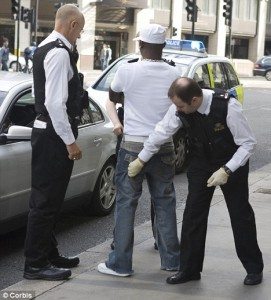 When providing consent, you have the right to limit the scope of a search if you choose to. This means you may confine the search to only a specific area or for a limited amount of time. You may also call off the search at any time if you later change your mind. Officers who violate the terms of a consented search could be subject to disciplinary action, and you may also ask to have any evidence that was illegally obtained excluded.
When providing consent, you have the right to limit the scope of a search if you choose to. This means you may confine the search to only a specific area or for a limited amount of time. You may also call off the search at any time if you later change your mind. Officers who violate the terms of a consented search could be subject to disciplinary action, and you may also ask to have any evidence that was illegally obtained excluded.
When consenting to a search, officers may ask you to sign a piece of paper waiving your rights. Be sure you read this document carefully to ensure you are in agreement with the terms; otherwise, it might be difficult to dispute the search later.
Officers may try to coerce you into consenting to a search by threatening to get a search warrant, or they may attempt to conduct it despite your protests. Be sure you clearly state your objection in order to have a better chance at having evidence dismissed later. If possible, object in front of a witness who can back your story up if need be.
Illegal Phone Tapping
 As with searches, warrants are required before police can monitor your telephone conversations. Although warrants are required, they are not always obtained ahead of time. Advances in technology have made it very easy for police to intercept your phone calls and text messages in addition to using your phone’s GPS capabilities to pinpoint your exact location at any given time.
As with searches, warrants are required before police can monitor your telephone conversations. Although warrants are required, they are not always obtained ahead of time. Advances in technology have made it very easy for police to intercept your phone calls and text messages in addition to using your phone’s GPS capabilities to pinpoint your exact location at any given time.
The Federal Wiretap Act governs the use of wiretaps to monitor phone conversations. Section 2515 of that act specifically prohibits the content of intercepted conversations to be used as evidence in any criminal hearing. In other words, phone conversations may be used to gather the necessary information to make an arrest, but are inadmissible in court. As such, you can ask that transcripts of any phone conversations be suppressed during a criminal trial.
If information was obtained from an illegal wiretap, it must also be suppressed. The “fruits of the poisonous tree doctrine” states that any evidence gathered from a tainted source (the tree), is “poisonous”, and therefore inadmissible. As such, you could ask for this evidence to be dismissed, which could lead to charges being dropped.
The Federal Wiretap Act also allows for civil damages to be awarded to victims of illegal wiretapping. The amount of damages begins at $10,000, and is based upon a number of factors, including how long the wire tapping took place and how invasive it actually was. To recover damages, you will need to speak with a civil rights attorney for an assessment of your case. A private investigator may also be needed in order to prove illegal phone tapping did indeed take place. You can usually recover the cost of an investigator as well as attorney’s fees in addition to civil damages.
Miranda Warnings
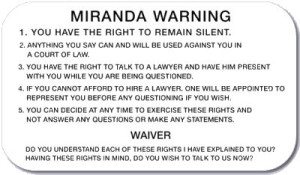 A landmark Supreme Court case, Miranda v. Arizona, paved the way for what are known as Miranda Warnings. These warnings must be read to you whenever you are taken into custody and are not free to leave. During the course of a normal interrogation, you may leave at any time, which is why they are not required then. Things that must be included in these warnings are:
A landmark Supreme Court case, Miranda v. Arizona, paved the way for what are known as Miranda Warnings. These warnings must be read to you whenever you are taken into custody and are not free to leave. During the course of a normal interrogation, you may leave at any time, which is why they are not required then. Things that must be included in these warnings are:
- The fact that you have the right to remain silent
- Anything you say can and will be used against you in a court of law
- You have the right to an attorney
- If you cannot afford an attorney, one will be appointed to represent you
No certain words are required to be used, so long as the right message is conveyed. If officers fail to render Miranda Warnings, any evidence they obtain from subsequent questioning cannot be used during trial. It’s important to notify your attorney early on if you were not given Miranda Warnings. That way, evidence can be suppressed as soon as possible, and could even mean you would be allowed your freedom much sooner as well.
Unlawful Arrest
 Our Founding Fathers also believed in the concept of maintaining one’s innocence-so much in fact that they believed it was more important for a guilty person to be set free than to have an innocent person incarcerated. This is the primary reason why prosecutors are required to prove your guilt “beyond a reasonable doubt.” That doesn’t mean you can’t still be charged with a crime you didn’t commit. If you are arrested for a crime, you should do certain things regardless of your guilt or innocence, including:
Our Founding Fathers also believed in the concept of maintaining one’s innocence-so much in fact that they believed it was more important for a guilty person to be set free than to have an innocent person incarcerated. This is the primary reason why prosecutors are required to prove your guilt “beyond a reasonable doubt.” That doesn’t mean you can’t still be charged with a crime you didn’t commit. If you are arrested for a crime, you should do certain things regardless of your guilt or innocence, including:
- Requesting to be represented by an attorney. If you cannot afford one, ask the courts to appoint one for you
- Insisting on hearing the charges so you will know what crime you are being accused of
- Demanding to see the evidence presented against you so you can examine and rebut it
- Exercising your right to confront your accusers as stated in the Fourteenth Amendment to the U.S. Constitution
- Asking for a fair and speedy trial as guaranteed in the Sixth Amendment of the U.S. Constitution
In any criminal matter, the role of protecting your rights largely falls on your attorney. That doesn’t mean you shouldn’t be diligent about protecting your own rights, as you are more likely to have a satisfactory outcome if you are heavily involved in your own defense. Make sure your attorney knows of any potential rights violations that have occurred so that any associated evidence can be tossed out or charges reduced or dropped.
Police Brutality
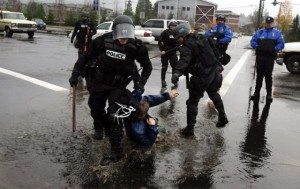 Just because you are behind bars doesn’t mean you should be physically, mentally or emotionally abused. The Eighth Amendment to the U.S. Constitution prohibits “cruel and unusual punishment”, which also includes abuse. Unfortunately, some officers do mistreat prisoners, and some of the things they might do are:
Just because you are behind bars doesn’t mean you should be physically, mentally or emotionally abused. The Eighth Amendment to the U.S. Constitution prohibits “cruel and unusual punishment”, which also includes abuse. Unfortunately, some officers do mistreat prisoners, and some of the things they might do are:
- Withholding food, water or medical care
- Failing to provide a reasonable amount of recreation
- Shackling or cuffing individuals for extended periods of time
- Subjecting individuals to beatings or torture
- Playing “mind games” or subjecting defendants to psychological torture
- Providing accommodations that are unsafe to be in
- Using a taser without cause
- Sexual abuse
Officers may perform these acts and then promise to stop if you “cooperate” with them. They may sometimes do them because they enjoy having power over others or want inmates to perform certain favors for them. Regardless of the reason, it is a criminal offense, and you are protected under the law.
Relief for Police Brutality
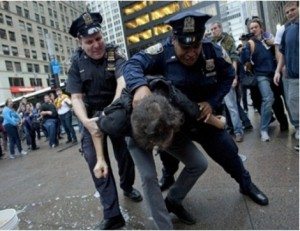 Many times, allegations of police misconduct are swept under the rug by those in charge in an effort to avoid negative publicity. This can make it hard to obtain justice, since you may feel as though you have nowhere to turn. That doesn’t mean you have no recourse, as hundreds of people have successfully brought civil suits against police over the years, winning millions of dollars in judgments and resulting in the firing of hundreds of officers. Your best bet would be to speak with a personal injury attorney who can better advise you as to your rights. You may do this even if you are currently incarcerated.
Many times, allegations of police misconduct are swept under the rug by those in charge in an effort to avoid negative publicity. This can make it hard to obtain justice, since you may feel as though you have nowhere to turn. That doesn’t mean you have no recourse, as hundreds of people have successfully brought civil suits against police over the years, winning millions of dollars in judgments and resulting in the firing of hundreds of officers. Your best bet would be to speak with a personal injury attorney who can better advise you as to your rights. You may do this even if you are currently incarcerated.
Some people have also obtained relief from abuse in the criminal justice system by speaking with the media. This is normally effective only under the most severe circumstances, such as when injuries require hospitalization or permanent disfigurement. Attempting to speak with the media while still incarcerated is not a good idea, as doing so can sometimes make the abusive situation worse.
Police must also take reasonable measures to prevent you from being harmed by other offenders. This can include anything from the housing you in a different cell to providing protective custody. If the police fail to provide you with adequate protection, you could file a civil lawsuit against the department for negligence.
Sexual Activity Behind Bars
 Federal law makes it a crime for sexual activity to take place between a guard and an inmate, regardless of whether or not the act is consensual. According to the law, sexual activity does not have to include penetration, as unwanted touching or fondling is also prohibited.
Federal law makes it a crime for sexual activity to take place between a guard and an inmate, regardless of whether or not the act is consensual. According to the law, sexual activity does not have to include penetration, as unwanted touching or fondling is also prohibited.
Sexual activity between guards and offenders compromises the integrity of the profession, in addition to undermining security at the facility. It is considered an extreme violation of trust since it often leads to drug smuggling or escape attempts. Officers who commit sexual abuse against offenders can be sentenced to up to one year in prison, or longer if threats or violence were used. Some states automatically classify these acts as felonies as well.
If you are the victim of sexual abuse, you should speak with an attorney who can better advise you what your rights are. You may also file a formal complaint with the warden of that facility or request a transfer to a different institution.
As a United States citizen, you are guaranteed certain rights under the Constitution. It’s important to know what these rights are so you can exercise them if and when the situation dictates. Any time there has been a violation of your civil rights, there is always at least one course of action you can take in order to obtain justice. Being prepared to stand up for your rights is one of the best ways to ensure freedom for the next generation.
Related:
Back to Can You Believe it’s Legal?
Top 12 Paralegal Degree Specializations
Top 25 Best Value Online Paralegal Certificates
Top Online Bachelor’s in Paralegal Degree Programs
Top 25 Best Online Master’s in Legal Studies